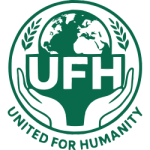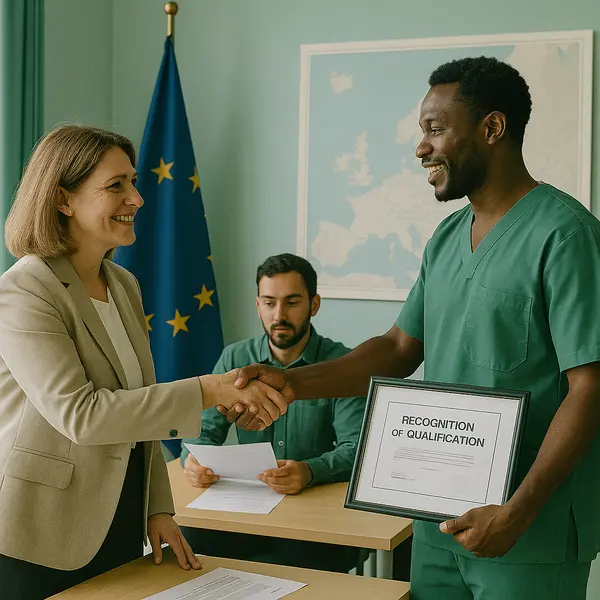When refugees and displaced persons arrive in a new country, one of their greatest hopes is to continue the careers they built back home. Yet too often, years of education, professional training, and licensure remain unrecognized behind bureaucratic barriers. At United for Humanity (UFH), we believe that every individual’s expertise deserves a chance to shine—regardless of where it was acquired. Our Foreign-Qualification Recognition program helps newcomers navigate complex EU systems, validating their skills and opening doors to meaningful employment.
Understanding the Recognition Challenge
In the European Union, each member state maintains its own regulatory framework for validating foreign qualifications. While Directive 2005/36/EC harmonizes certain professional recognition rules for regulated professions (doctors, nurses, architects, etc.), the practical process involves:
Document Authentication: Verifying diplomas, transcripts, and professional certificates with issuing institutions abroad.
Language Requirements: Proving proficiency in the host country’s official language(s) through standardized tests.
Bridging Measures: Completing adaptation periods or aptitude tests when qualifications differ significantly from national standards.
Administrative Delays: Processing times can stretch from several months to over a year, during which professionals may be unable to work in their field.
These hurdles not only stall career trajectories—they can also erode self-esteem, devalue specialized expertise, and force highly skilled individuals into underemployment.
UFH’s Four-Step Pathway to Professional Reintegration
To dismantle these barriers, UFH has developed an integrated support model comprising four key components:
Comprehensive Case Assessment
Credential Audit: UFH counselors conduct in-depth reviews of each applicant’s academic and professional records, identifying which documents require legalization, translation, or additional verification.
Regulatory Mapping: We map each individual’s profile against host-country requirements, clarifying whether they fall under EU-wide automatic recognition rules or national procedures.
Document Support & Liaison
Certified Translations: Through partnerships with accredited translation agencies, UFH arranges certified language conversions of all necessary documents.
Institutional Outreach: We coordinate directly with foreign universities, professional bodies, and embassies to obtain apostilles, certified copies, and affidavits—streamlining the authentication process.
Language & Bridging Courses
Tailored Language Coaching: Leveraging UFH’s network of volunteer tutors, we offer specialized language modules focused on sector-specific terminology (e.g., medical, legal, engineering lexicons).
Bridging Seminars: In collaboration with vocational institutes and universities, UFH co-delivers short adaptation courses and exam-prep workshops designed to close gaps between foreign curricula and EU standards.
Mentorship & Job Placement
Professional Mentors: We match candidates with mentors working in their field—experienced engineers, nurses, teachers—who provide guidance on licensing exams, regulatory interviews, and workplace culture.
Industry Partnerships: UFH’s corporate allies reserve internship slots, fast-track job applications, and host career fairs where internationally trained professionals can connect with employers committed to diversity.
Success Stories: Expertise Unlocked
Dr. Ahmed’s Medical License at Last
Background: A pediatrician in Damascus for over a decade, Dr. Ahmed arrived with his wife and two children in Germany in early 2023. Despite stellar credentials, he faced repeated rejections for lack of certified translations and an unfamiliar examination format.
UFH Intervention:
Conducted a full credential audit and secured translations through our pro bono agency partner.
Enrolled him in a six-week German-medical terminology course.
Paired him with a senior UFH mentor—an immigrant doctor now leading pediatric wards in Berlin.
Outcome: Within nine months, Dr. Ahmed passed the state medical examination and obtained his Approbation, now treating young patients and training other refugee doctors.
“UFH didn’t just translate my papers—they translated my future.”
Maria’s Classroom Comeback
Background: A high-school teacher of mathematics in Bogotá, Maria held a master’s degree but was forced to flee due to unrest. Arriving in Spain, she struggled with the homologación process and felt isolated in her new community.
UFH Intervention:
Guided her through Spain’s homologación portal, handling paperwork and embassy attestations.
Paired her with an experienced Spanish math teacher for weekly language labs using UFH’s custom coursework.
Hosted her at a UFH career fair, where she interviewed with a local international school.
Outcome: Maria now teaches at a bilingual institute near Valencia, co-leading an after-school tutoring program for refugee students.
“They saw my degree, believed in my voice, and gave me back my purpose.”
Measuring Impact
Since launching in mid-2022, UFH’s Foreign-Qualification Recognition program has achieved:
850+ Professionals Supported, spanning 23 nationalities and 12 EU states.
72% License Success Rate within one year of application—compared to an EU average of 45% in self-navigated cases.
1,200+ Course Hours Delivered in language and bridging seminars.
300+ Mentor Matches, fostering peer networks and sectoral insights.
These outcomes underscore how targeted assistance not only expedites licensure but also fosters psychological well-being and community integration.
Looking Ahead: Scaling Recognition Efforts
To meet growing demand and evolving policy landscapes, UFH plans to:
Develop a Digital Portal: A centralized dashboard where applicants can track document status, access e-learning modules, and schedule mentor sessions.
Advocate for Policy Reform: Collaborate with EU agencies and NGOs to simplify recognition procedures and reduce mandatory adaptation periods.
Expand to Non-Regulated Sectors: Launch pilot programs for qualifications in fields such as IT, hospitality, and creative arts—where formal recognition pathways are less defined.
How You Can Support Professional Reintegration
The journey from foreign credential to local recognition requires expertise, funding, and goodwill. You can contribute by:
Donating: Funds cover translation fees, course materials, and mentor stipends.
Volunteering: If you’re a qualified professional in engineering, healthcare, education, or law, join our mentor network.
Partnering: Institutions, universities, and companies can provide internships, scholarships, and fast-track hiring programs.
Visit ufh.info/educational-support/foreign-qualifications to learn more and get involved.
Conclusion
When we unlock the professional potential of refugees, we do more than fill labor gaps: we affirm their dignity, honor their expertise, and strengthen our societies with diverse perspectives. At UFH, our commitment to recognizing foreign qualifications transcends paperwork—it’s an investment in human potential. Let’s work together to ensure no talent remains unseen, and every journey finds its rightful destination.


